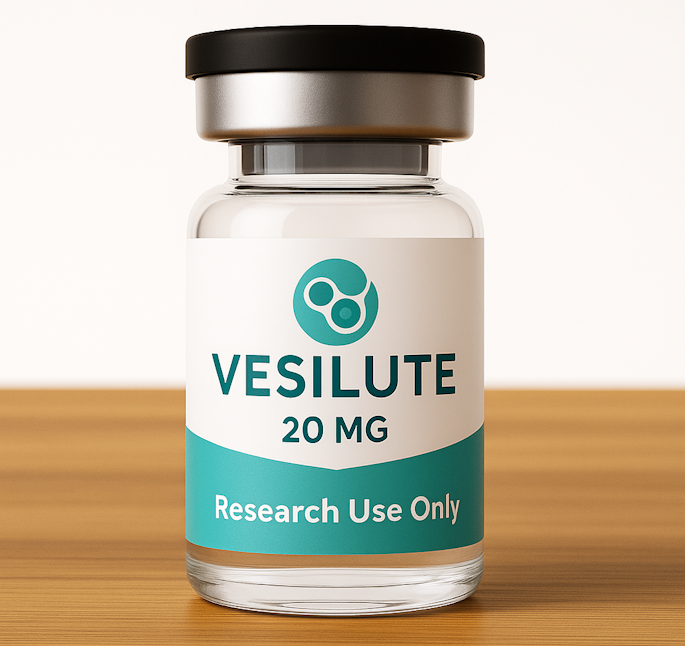Delving into the Science of Vesilute Peptide
Providing clear, trusted insights on Vesilute Peptide for informed choices.

Vesilute Peptide – Advanced Research for Bladder and Prostate Health
Supporting Bladder and Prostate Research
The vesilute peptide is a specialized bioregulator peptide designed for laboratory experimentation and vitro testing only. As part of the family of peptide bioregulators, it is used by qualified professionals to explore the mechanisms that influence bladder function, prostate health, and related cellular processes.
This research chemical is intended strictly for research purposes and is strictly forbidden for bodily introduction or any form of ingestion by humans or animals. Vesilute provides valuable insights for the development of new approaches to reducing inflammation, aiding cell proliferation, and improving the function of various organs within the urinary system.
The Role of Vesilute in Research
The urinary tract plays a vital role in maintaining overall health by supporting the removal of waste and promoting normal functioning. Bladder issues such as chronic cystitis, benign prostatic hyperplasia, or prostate enlargement are common concerns, especially in the elderly population.
Research with Vesilute focuses on enhancing bladder function, exploring the potential effects of glu asp peptide on cells and cellular communication. Through vitro testing, scientists can analyze how this compound may support the function of the prostate gland, improve sperm quality, and study fertility outcomes without risk to living subjects.
Composition and Structure
Vesilute is a glu asp peptide containing glutamic acid and aspartic acid, two essential amino acids identified for their role in fundamental biochemical processes. Its molecular weight, molecular formula, and quantity are carefully measured to ensure consistency for research and testing purposes.
The study of biochemical processes at the cellular level helps researchers better understand gene expression, metabolic processes, and the ability of cells to adapt under various contexts. This contributes to the development of safer drug research and prevention strategies for various diseases.
Potential Research Applications
When used properly under laboratory conditions, Vesilute has shown potential benefits in areas such as:
- Studying mechanisms related to reducing inflammation in the bladder wall and surrounding tissues.
- Exploring ways to enhance bladder function and support urinary tract health.
- Evaluating how Vesilute interacts with other cytomedines and peptides to improve cellular function and fertility.
- Assessing the beneficial role of glu asp compounds in cellular communication and function.
- Research into sperm quality, fertility, and well being related to the prostate and urinary system.
These areas of research, including benign prostatic hyperplasia, may one day contribute to new methods of treatment, prevention, and relief for issues connected to prostate and bladder health, though Vesilute itself is not an approved drug and must never be used outside a laboratory setting.
Safety and Legal Considerations
Vesilute is strictly forbidden for bodily introduction, direct ingestion, or use as food, supplement, or cosmetic product. Handling must be done only by qualified professionals who follow proper testing protocols and safety measures.
The law requires that all research chemicals strictly adhere to safety regulations. Vesilute is intended solely for laboratory work, aiding in scientific contexts where accurate data collection and support for future innovations in biochemical processes are required. Improper handling or misuse could pose significant risk.
Why Choose Vesilute for Research
Vesilute is manufactured to meet precise standards, including its molecular weight ensuring each quantity is consistent for laboratory experimentation. Researchers rely on this peptide to investigate prostate, bladder, and urinary tract functions, study inflammation, and examine cell proliferation without compromising safety.
By providing a stable, reliable research chemical, Vesilute helps laboratories explore potential effects on cellular function, cells, tissues, and organs, paving the way for innovations that could one day support human health and well being.
Frequently Asked Questions
Q: What is the best peptide for fat loss?
The best peptide for fat loss depends on your specific goals and overall health, but some peptides are widely studied for their ability to boost metabolism, promote fat burning, and preserve lean muscle mass during weight loss.
- AOD 9604 – A fragment of human growth hormone (HGH) that specifically targets fat metabolism without affecting blood sugar or growth hormone levels.
- CJC-1295 with Ipamorelin – Stimulates natural growth hormone release, which can aid in fat loss, muscle recovery, and overall body composition improvement.
- Tesamorelin – Commonly used in research for reducing stubborn visceral fat, particularly in the abdominal area.
- GLP-1 agonists (like Tirzepatide or Semaglutide) – Though technically not peptides in the traditional sense, they are peptide-based medications known to significantly reduce appetite and support weight loss.
Q: What are the benefits of Vesugen peptide?
Vesugen peptide is a type of peptide bioregulator designed to support vascular health, particularly the blood vessels and central nervous system. It is primarily researched for its role in:
- Improving vascular function – May help maintain normal blood flow and support the bladder wall and other tissues.
- Reducing inflammation – Helps address chronic inflammatory conditions within the urinary tract and other organs.
- Supporting cellular processes – Plays a role in protein synthesis, gene expression, and cellular communication at a cellular level.
- Promoting overall well-being – By optimizing the function of blood vessels and urinary structures, Vesugen may contribute to better health and well being, particularly in elderly populations.
Q: What are the negatives of taking peptides?
While peptides can offer potential benefits in research and medical contexts, there are also risks and negatives associated with their misuse or unsupervised use:
- Unregulated quality – Many peptides sold online lack proper rigorous third-party testing, leading to purity and dosage concerns.
- Side effects – Improper dosing or unverified products may cause inflammation, water retention, hormonal imbalances, or even more serious issues like organ stress.
- Legal concerns – In many countries, including the U.S., peptides like BPC-157 or growth hormone secretagogues are considered research chemicals strictly, not approved drugs or supplements.
- Unknown long-term effects – Since many peptides are still under development, the full range of potential effects and risks to humans is not fully understood.
- Improper bodily introduction – Using peptides outside of laboratory experimentation poses a direct risk to health.
Q: What is the best peptide for neuropathy?
Neuropathy, or nerve damage, often requires a comprehensive approach to support nerve repair, reduce inflammation, and improve nerve signaling. While no single peptide is a universal solution, certain peptides are actively researched for their neuroprotective potential:
- Semax – Known for supporting brain and nerve health by aiding cellular communication and neuroprotection.
- DSIP (Delta Sleep Inducing Peptide) – May help reduce inflammation and support cellular processes related to nerve recovery.
- BPC-157 – Widely studied for wound healing, tissue repair, and its ability to support the function of nerves and blood vessels.
- Thymosin Beta-4 (TB-500) – Helps with cell proliferation, tissue regeneration, and reducing inflammation, which can benefit nerve healing.
Final Notes
As part of the peptide bioregulators family, Vesilute represents an essential tool for advancing scientific understanding of the urinary tract, prostate, and bladder function. While this compound, which includes aspartic acid, is not approved for drug use or direct treatment, its role in research remains invaluable.
Explore Vesilute responsibly, with a commitment to safety, accuracy, and compliance with all regulatory guidelines.
